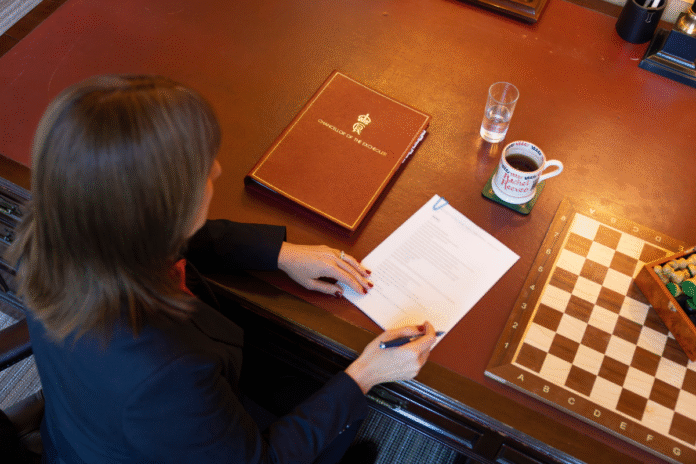The Autumn Budget was thrown into turmoil after the Office for Budget Responsibility mistakenly published its economic and fiscal risks report, setting out in detail the Chancellor’s tax plans and long-term forecasts.
The document confirms that the government will raise £26 billion through a series of measures that will push the overall tax burden to a record 38% of GDP by 2031 – including Mansion Tax.
Central to the package is a three-year freeze in income tax thresholds, projected to raise £8 billion, alongside a £4.7 billion increase in revenue from tighter rules on pension contributions by both employers and employees.
The leak sparked a political backlash as well as anxiety across the housing market, where uncertainty around property-related tax changes has already dampened activity.
Analysts warned that the emerging fiscal strategy risks extending the slowdown in transactions, particularly in higher-value segments where buyers have been anticipating potential changes to property taxation. Market data was already pointing to a more cautious environment ahead of today’s statement.
UNFAIR PRIVILEGE TAX

Scott Clay, director at Together, said: “Confirmation of the mansion tax is really concerning to see.
“This is essentially an unfair “privilege” tax for homeowners with properties worth £2 million plus, who will now have to pay an annual charge, for the home they already own.
“If the goal was to make winter feel even harsher, mission accomplished.”
“If the goal was to make winter feel even harsher, mission accomplished. Many recent buyers have already paid for the property, plus stamp duty, and now face an extra annual surcharge on top of council tax and mortgage payments.
“It’s unlikely the government will carry out any affordability checks, so lenders will need to factor this additional cost into mortgage assessments for homes above the threshold.
“Those hit hardest will be ‘empty nesters’ and people who bought their property decades ago simply as a family home, not as an investment. Asset-rich but cash-poor older homeowners could really struggle, as this tax could be equivalent to an entire year’s state pension.”
RISKY MOVE

Following the OBR Report confirming Mansion Tax on homes over £2m, Nick Sanderson, Audley Group CEO, said: “Opting to play with taxes at the top of the housing market is inherently risky.
“The top of the ladder is often the driver of market movement and the new mansion tax will undoubtedly put the brakes on.
“Larger family homes become immediately less appealing to prospective buyers, particularly in areas where house prices have grown significantly like the South East.
“The government had an opportunity to get the housing market functioning as intended. Instead, it has introduced counterproductive barriers which will lock up valuable housing stock, reduce transactions and put yet more pressure on the housing market.”
YEARS OF UNCERTAINTY

Tom Bill, head of UK residential research at Knight Frank, said: “Until the revaluations take place, buyers and sellers face years of uncertainty, especially around the £2 million threshold. Even once completed, new valuations can be challenged, which would prolong the limbo.
“The policy may also raise less than expected, especially because it is deferrable. If opposition parties say they would scrap it, many homeowners will look at the opinion polls and wait it out. When you factor in the cost of carrying out the valuation and the potential lost stamp duty revenue from a stickier market, the sums raised could look like a rounding error for the Treasury.”
MANSION TAX
And he added: “More properties will inevitably get dragged into the mansion tax net, which means the proportion of terraced houses, flats and semi-detached homes will grow over the years, particularly in the capital. The term ‘mansion tax’ will increasingly feel like a misnomer.
“Overall, it feels like politics has trumped economics. One the one hand, the policy is designed to keep backbenchers happy and ensure the near-term survival of the Chancellor and Prime Minister.
“On the other, it throws a spanner into the works of the housing market for not much money in return, which is important in the context of a Budget where spending is front-loaded. The UK already pays the highest percentage of property taxes among OECD countries.”
MARKET CATALYST

Stuart Bailey, head of super prime London sales at Knight Frank, added: “In just over 24 hours prior to the Budget, our London teams exchanged on £90m of property, far exceeding an average Tuesday.
“Speculation around anticipated tax changes has acted as a catalyst for the market in recent weeks, across all levels of the housing ladder.
“Whilst some buyers and sellers have wanted to get ahead of the Budget, others are waiting to see, and we will likely experience some renewed activity immediately post Budget too.”
PUNISHMENT TAX

Nigel Bishop, founder of buying agency Recoco Property Search, said: “This tax is an outright punishment for those who have been able to buy a property decades ago, that since has gone up in value. It could mean financial ruin for many of these homeowners.
“A vast majority will have no other option but to sell up; likely at reduced asking prices. In theory, this frees up larger homes but doesn’t automatically mean there will be buyers waiting. On the contrary, I believe that the Chancellor’s idea of mansion tax will grind the property market to a halt.”
ASSET RICH, CASH POOR

James Nightingall, founder of HomeFinder AI, says: “A vast number of London property owners will be hit by Mansion Tax, particularly in central London where property values quickly exceed the £2m threshold.
“The problem is that the majority of these homeowners are asset rich but cash poor and will struggle to finance an annual levy of this magnitude.”
RUSH TO SELL

Matthew Thompson, head of sales at Chestertons, added: “We could see homeowners rushing to sell their home before the new tax takes effect but buyers will think twice to purchase a home that will be subject to such a levy in the future.
“This could lead to more high-value properties standing empty or force sellers to drastically reduce their asking price.”
UNCERTAIN TIMES AHEAD

Simon Main, Partner at Cripps, a top 100 UK law firm, said: “It is clear that the government’s ‘mansion tax’ will have a significant impact on the pricing, liquidity, and long-term ownership strategies in the prime central London market.
“From a legal perspective, much remains uncertain. Key questions, such as how properties will be valued, who will carry out the valuations, and who will bear the costs, suggest the application of any such levy will be fraught with difficulties.”
DAMAGING AND COUNTERPRODUCTIVE

Jo Eccles, founder and managing director of prime central London buying agency, Eccord, said: “The continued pursuit of those with wealth is deeply damaging and counterproductive.
“It doesn’t just impact the ultra-wealthy who are highly mobile and now have another reason to move elsewhere, at a significant loss to the UK economy.
“This measure directly impacts London’s upper-middle classes.”
“With the threshold set at £2 million, this measure directly impacts London’s upper-middle classes – who are typically households with mortgages and finite resources.
“Their outgoings can only stretch so far. Sentiment and morale are being pushed even lower, and many of them no longer view the UK as a place for prosperity where hard work and success are encouraged.
“One city professional told me recently that VAT on school fees alone is costing him an extra £700 a month, and if a mansion tax is added on top he will move to Switzerland. For many like him, this will be the final straw.
“This measure is likely to create a cliff edge at the £2m million mark and would effectively freeze the market just above it.
“We could see pressure on properties above those levels as sellers are forced to shoulder part of the burden by reducing their asking prices. And what about tenants? If this tax is collected through council tax then the liability will sit with them, pushing rents down and further discouraging landlords to stay in the market.”
DISTORTED BUYER BEHAVIOUR

Jason Tebb, President of OnTheMarket, says: “This will hit London and the South East hardest, where 80% of £2m+ homes sit.
“The market is now being faced with distorted buyer behaviour, price stagnation at the top end, and a ripple effect across the wider market. Ironically, it could even undermine the very tax revenue it aims to raise as transactions drop in response.
“Those who will be hit hardest are retirees or long-term owners who bought their homes decades ago.”
“Those who will be hit hardest are retirees or long-term owners who bought their homes decades ago. Their property value may have doubled or trebled, but their pension income has not. They could now be facing tax bills that exceed their disposable income.
“The market impact may well be a “ceiling” effect just below the £2m mark with sellers forced to reduce asking prices to make the property attractive to buyers avoiding the surcharge. This was the effect of historic Stamp Duty “ceilings” in which properties above £250k saw a straight jump from 1% to a 3% rate, so buyers were offering £249,999 on properties on the market for as much as £270k.
“Current Council Tax bands remain based on valuations from the early 90s (1991). To implement this surcharge, the Valuation Office Agency must revalue high-end properties in the context of today’s market.
“This is complex, subjective, and likely to lead to a massive spike in appeals and litigation from owners challenging their valuations to get under the £2 million threshold.”
TOUGH BUDGET FOR LANDLORDS

Hugo Davies, chief capital officer and managing director for Mortgages at LendInvest, said: “This is another tough Budget for landlords and property investors, with higher taxes on rental income, capital gains and pension contributions.
“It will squeeze returns for many smaller, individual landlords. But it will also accelerate a trend we’ve seen for years: the shift toward larger, professionalised Buy-to-Let operators and portfolio landlords, whose structures are far more resilient to government tax changes.”
REAL CONCERN

Dave Harris, CEO at more2life, said: “Older homeowners will be feeling the pinch from this Budget, irrespective of the benefits of the Triple Lock on their State Pension.
“Extending the freeze on tax thresholds will drag greater numbers into paying more tax to the Treasury, with more pensioners paying Income Tax on their pension payments, while there is a bigger chance now that homeowners will see expected house price growth pushing their estates into the area of Inheritance Tax payments.
“Couple that with the introduction of the new Council Tax surcharge on high-value properties, and it’s inevitable there will be real concern amongst older homeowners about how best to handle their increased outgoings on tax.
“Being able to tap into their most valuable asset – their home – is only going to become more important due to these rising costs, and we need to ensure they are signposted effectively to advisers so they can get the professional support they need.”
POLITICAL THEATRE

Jeremy Leaf, north London estate agent and a former RICS residential chairman, says: “Mansion tax change seems more political than anything bearing in mind the relatively little additional revenue to be raised and the likely deferred payment date.
“As a result, the impact on housing market activity will probably be minimal at worst.
“However, I wish the Government luck trying to re-value all those properties and dealing with the arguments around the ‘pinch points’.
“As a result, the cost of the exercise could turn out to be higher than the extra sums making their way into Treasury coffers.
“As is often the case when attempting to analyse the Chancellor’s words on these occasions – it’s just as important what she says as what she doesn’t say.”
VALUATION HEADACHE

Mark Harris, chief executive of mortgage broker SPF Private Clients, said: “As expected, the Chancellor introduced a ‘Mansion Tax’, imposing an annual levy on homes worth more than £2 million, hitting London and the South-East hardest.
“However, while a ‘Mansion Tax’ may be popular among Labour backbenchers, it will be difficult and time-consuming to implement, rather than a quick fix to the shortfall in the country’s finances.
“Properties will need to be valued and then homeowners are likely to challenge those valuations. Those living in large houses who have equity tied up in their homes but don’t have cash to spare to pay an annual tax will struggle to pay this levy and may choose to defer instead – resulting in less tax paid.”
SOFTEN DEMAND

Daniel Austin, CEO and co-founder at ASK Partners, said: “The Mansion Tax announced in today’s Budget will likely soften demand for higher-end homes, especially those near the £2 million threshold where the impact is greatest.
“While the super-prime market may absorb the charge, the wider upper tier can expect renewed price pressure and slower growth.
“We may see a brief pre-implementation rush, but just as many owners could delay selling to avoid the levy, reducing turnover and constraining supply. The burden will fall hardest on asset-rich, cash-poor households in high-value areas such as London.
“It is disappointing that stamp duty reform was overlooked. As one of the biggest barriers to market mobility, leaving it untouched will continue to create friction in an already subdued market.
“The OBR’s downgraded growth forecasts, as a result of the budget, prove that supporting transactions should have been central to today’s package.”
FROZEN MARKET

Paula Higgins, CEO of the HomeOwners Alliance, said: “The immediate result will be a freeze in the top end of the market as buyers and sellers wait for the outcome of the valuations.
“We’ll wait to hear further details about how the High Value Council Tax Surcharge – or mansion tax – will be set up in the planned public consultation in early 2026.
“But our initial response is we’re sceptical about whether the revaluation needed for this mansion tax can be delivered cleanly and on time. A mass revaluation of bands F to H will inevitably trigger large numbers of appeals. Without clear valuation rules, adequate resourcing, and a straightforward process people can trust, this risks becoming chaotic, slow, and deeply contentious.
“Another key concern for homeowners is whether this is the thin end of the wedge?”
Another key concern for homeowners is whether this is the thin end of the wedge? Once measures are introduced, they have a habit of being extended or thresholds not being updated, and more people end up paying tax as a result.
“This mansion tax could quickly become relevant for more homeowners than the Chancellor anticipates.
“We expect these arbitrary thresholds of a mansion tax will distort the market, which OBR has recognised will cause bunching of sales just below the thresholds.
“We need to remember that people living in high-value homes aren’t always cash-rich. Many are stretched, still paying big mortgages, and have simply ridden a wave of rising prices.
“A mansion tax would freeze investment in homes over £1million overnight, as owners hold back on improvements to avoid being pushed over a threshold the government will almost certainly freeze.”
LACK OF SUPPORT

Richard Sexton, commercial director of proptech surveyor portal Houzecheck, said: “Rachel Reeves could have done us all a favour by reducing stamp duty rates for first-time buyers and all residential purchases below £500,000.
“Lowering a transaction tax like this would have decreased upfront costs for buyers and stimulate demand, especially among younger first-time buyers. Evidence from past cuts shows sales volumes increasing within months.
“She could have introduced a temporary stamp duty holiday for properties under £750,000 for the next 12 months.
“The new Mansion Tax signals precisely the opposite.”
“Historically these boost market activity – just look at the impact this had in 2020 when buyers rushed to complete deals before the due date and sellers list more properties.
“A cut in stamp duty would have signalled government support for brokers, conveyancers and agents. The new Mansion Tax signals precisely the opposite.
“As a proptech, we’d also like to have seen more focus on AI skills; while we’re one of the largest independently-owned valuation chains in England and Wales, we still need more people with machine learning skills to help speed up delivery of our reports and improve their quality even further.”
WEALTH TAX

Rob Clifford, chief executive of Stonebridge, said: “While ministers may avoid calling it one, this proposal amounts to a wealth tax on higher-value homes.
“It feels like a short-term revenue-raising measure designed to plug a fiscal gap, rather than a considered reform of an outdated system.
“Few would dispute that owners of more valuable properties should contribute more. The issue is the way the government has chosen to approach it. A more sensible long-term and fairer solution would be to reform the whole system, rather than layering on more complexity.
“As things stand, this change offers little benefit to anyone. Households in higher-value homes will pay more, yet those at the lower end see no relief. It will also likely cause market distortions around the £2m threshold Ultimately, the UK needs a long-term approach to property taxation – one that modernises the system rather than relying on short-term fixes.”
DISCOURAGE DOWNSIZING

Simon Brown, CEO, Landmark Information Group, said: “Any property tax that rises steeply with value risks slowing the housing market at a particularly delicate time.
“We know from our data that affordability pressures and slow transaction times are already constraining activity. Adding new costs at the higher end of the market could discourage downsizing, keep larger family homes off the market and reduce overall mobility.
“A well-designed property tax should support a healthy flow of transactions and help strengthen, not stall, activity across the wider housing market.
“For the government to achieve its goals without dampening consumer and industry confidence, this new system must be implemented transparently and underpinned by accurate, up-to-date valuation data.”
More to follow…



